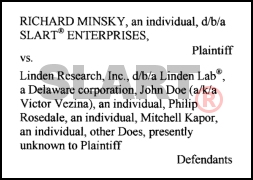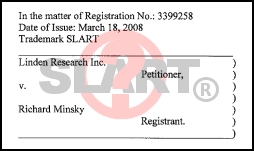Air Force Professor Says Supreme Court Okays Spying on Avatars — Help Track Down Mystery Case and Get a Signed Copy of Benjamin Duranske’s “Virtual Law”
October 16th, 2008 by Benjamin Duranske
 A reader sent me a link last week to a pretty incredible article in the Maxwell/Gunter Dispatch reporting that Professor George Stein, the Director of the Cyberspace and Information Operations Study Center at the Air Force’s Air War College (“The Intellectual and Leadership Center of the Air Force”) told people attending a seminar on security issues and emerging technology that it was okay to spy on avatars because “the Supreme Court has ruled that avatars are not real people” and that avatars are, thus, “not governed by laws.” The article does not identify any ruling by name.
A reader sent me a link last week to a pretty incredible article in the Maxwell/Gunter Dispatch reporting that Professor George Stein, the Director of the Cyberspace and Information Operations Study Center at the Air Force’s Air War College (“The Intellectual and Leadership Center of the Air Force”) told people attending a seminar on security issues and emerging technology that it was okay to spy on avatars because “the Supreme Court has ruled that avatars are not real people” and that avatars are, thus, “not governed by laws.” The article does not identify any ruling by name.
Professor Stein surmised that under this mystery ruling, “avatars aren’t real people, [so] the courts can’t have too much of a problem with us spying on them.” In addition, he said that “[3D internet] sites also offer long-term opportunities for covert influencing activities.”
Professor Stein even has a name for this — “Two-World Warfare.”
One seminar attendee offered this takeaway: “What interested me very much was the issue of privacy on the spaces, and how the law doesn’t apply to cyberspace.” As a guy who recently wrote several hundred pages about how the law does apply to these spaces, that very much interested me too.
I’m skeptical, but I would love to know what decision Professor Stein might have been talking about, and how he’s interpreting it. I haven’t had any luck with my usual research tricks, so I thought I’d run a contest in the comments. Help me out, and you could get a signed copy of my book, Virtual Law.
 Here’s the deal: take a stab at figuring out what Supreme Court case Professor Stein might be referencing, and tell me whether you think he’s right. This is the question we’re hoping to answer: Is there any case that can be read to say that avatars are not real people and thus that they are not governed by laws?
Here’s the deal: take a stab at figuring out what Supreme Court case Professor Stein might be referencing, and tell me whether you think he’s right. This is the question we’re hoping to answer: Is there any case that can be read to say that avatars are not real people and thus that they are not governed by laws?
Case analysis gets you the best shot at the book, but polemics, historical analysis, and jokes about spending tax dollars bugging Luskwood are worth points too. I expect readers will either find this mystery case or do a solid job debunking the claim. Either way, in two weeks I’ll pick the best comment and send the winner a signed copy of Virtual Law.
To get you started, here’s the relevant passage from the article:
Professor [George] Stein [of the Air War College] said … the Supreme Court has ruled that avatars are not real people, thus they are not governed by laws.
“Since these avatars aren’t real people, the courts can’t have too much of a problem with us spying on them,” he said. “The [3D internet] sites also offer long-term opportunities for covert influencing activities.”
Pass this one on to your constitutional law friends who don’t follow virtual worlds too, if you wouldn’t mind. I’d really like to cast a wide net here, since that’s the fastest way to get to the bottom of this claim.
Related Posts on Virtually Blind
- Interview: Employment Attorney Dave Elchoness Discusses IRS Ruling Holding that Electric Sheep’s Virtual World Greeters Are “Employees”: "The Second Life Herald recently reported that the IRS issued a ruling..." (6 comments)
- Second Life Child Pornography Allegations Draw International Press Attention: "Allegations of simulated and actual child pornography in Second Life..." (17 comments)
- Reminder: Free In-World CLE from the SL Bar Association Tuesday, July 15: "Quick reminder that the SL Bar Association's first CLE (Continuing..." (2 comments)


 Artist and “SLART” trademark-registrant Richard Minsky recently filed a
Artist and “SLART” trademark-registrant Richard Minsky recently filed a  The Cease and Desist Order that Minsky asked Linden Lab to transmit to ‘Watanabe’ states: “You can use ‘SL art’ to describe art made in-world, but not the combined mark ‘slart.’ The use of the mark ‘slart’ (or SLart or SLArt or any variant) is only for activities, products and services that I own or license.”
The Cease and Desist Order that Minsky asked Linden Lab to transmit to ‘Watanabe’ states: “You can use ‘SL art’ to describe art made in-world, but not the combined mark ‘slart.’ The use of the mark ‘slart’ (or SLart or SLArt or any variant) is only for activities, products and services that I own or license.” The9 has been waging an ongoing war against plugins. The company introduced anti-plugin software
The9 has been waging an ongoing war against plugins. The company introduced anti-plugin software  Second Life creator Linden Lab’s
Second Life creator Linden Lab’s 